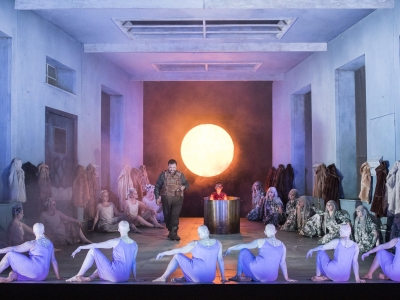

Macbeth Verdi
Archived: 2016/2017Trosolwg
Mae gan Macbeth waed ar ei ddwylo. Ond er ei fod nawr yn frenin, mae’r goron yn anesmwyth ar ei ben.
Disgrifiodd Verdi Macbeth fel ‘un o greadigaethau gorau dynol ryw’. Yn addas, mae ei addasiad cyffrous ac angerddol o’r ddrama enwog hon yn gynhyrfus a ffyrnig. Fel ag erioed, disgwyliwn Gorws a Cherddorfa WNO (mae nifer o gorysau syfrdanol) i ymfwrw i Macbeth a chreu noson hynod drydanol.
Cynhyrchiad ar y cyd ag Northern Ireland Opera.
Cefnogir gan Bartneriaid Opera Cenedlaethol Cymru.




Defnyddiol i wybod
Cenir yn Eidaleg gydag uwchdeitlau Saesneg (a Chymraeg yng Nghaerdydd a Llandudno)
Mae perfformiadau yn dechrau am 7.15pm
Mae'r cynhyrchiad yma yn cynnwys goleuadau sy'n fflachio
Synopsis
Act One
Macbeth and Banquo, generals in King Duncan’s army, have been victorious in battle. As they return home they encounter a coven of witches who prophesise that Macbeth will be Thane of Cawdor and thereafter King of Scotland, and that Banquo will be the father of future kings. Messengers arrive and tell Macbeth that the Thane of Cawdor has been executed as a traitor, and that he has now been given the title. The first of the witches’ prophesies has been fulfilled. Macbeth has written to his wife about the encounter with the witches, and she is determined to propel him to the throne by whatever means necessary. A messenger arrives to tell Lady Macbeth that Duncan will stay at their home that night, and she resolves to act. On his return, Macbeth is persuaded that he must kill the king. Macbeth nerves himself to kill Duncan, but then cannot bring himself to go back and leave the bloody knife with Duncan’s sleeping bodyguards, thereby implicating them in his murder. Appalled by his cowardice, Lady Macbeth takes the knife and plants it with the guards. Banquo and Macduff, a Scottish nobleman, discover the murder and rouse the household.
Act Two
Duncan’s son Malcolm is suspected of killing his father, and has fled the country, while Macbeth has been proclaimed King of Scotland. Fearful of the witches’ prophecy that Banquo will found a great royal line, Macbeth and his wife decide to have both Banquo and his son killed that night on their way to a banquet. Banquo and his son Fleance are ambushed by assassins. Banquo is caught and murdered, but Fleance escapes. Macbeth and Lady Macbeth receive their guests. The assassination of Banquo is reported to Macbeth, but when he rejoins the banquet he is horrified to see Banquo’s ghost sitting at the table. Lady Macbeth manages to calm him, but the ghost returns and the banquet ends prematurely, with Macbeth apparently insane, and an increasingly suspicious Macduff resolving to leave the country.
INTERVAL
Act Three
Macbeth visits the witches and they produce three apparitions who warn him to be aware of Macduff, but assure him that he need fear no man born of woman, and that he will be invincible until Birnam Wood marches against him. An apparition showing Banquo and his descendants – eight future Kings of Scotland – causes Macbeth to collapse in horror. When he recovers, Macbeth decides that Macduff must be killed.
Act Four
On the English border, Scottish refugees are concerned about the plight of their country, and Macduff swears to avenge the deaths of his wife and children at Macbeth’s hands. Malcolm joins Macduff along with an English army, and they order each soldier to cut a branch from a tree in Birnam Wood and advance on Macbeth’s forces. A doctor and a lady-in-waiting look on in horror as Lady Macbeth walks in her sleep, trying to wash imaginary blood from her hands and dwelling on the murders that she and Macbeth have committed. Meanwhile, Macbeth, preparing to take on the army of Macduff and Malcolm, receives news of Lady Macbeth’s death. Realising that Birnam Wood is indeed moving against him, he clings to the prophecy that no man of woman born can harm him, but when, on the battlefield, Macduff tells him that he was ‘from his mother’s womb untimely ripp’d’, he realises that he is doomed, and is killed. Malcolm is hailed as King, and his troops rejoice in the liberation of Scotland.



